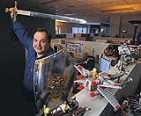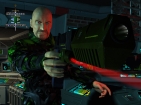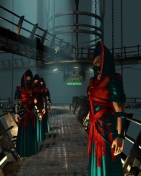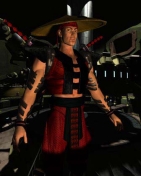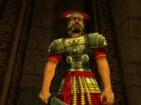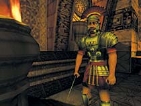|
|
Denis
Dyack dei Silicon Knights è senz'altro una delle
persone più disponibili che abbia mai visto. Appena il
tempo glielo permette, nelle pause fra un lavoro e
l'altro si prende la responsabilità di rispondere alle
domande e ai commenti che i videogiocatori gli porgono
su diversi forum (soprattutto sul post dedicato ai SK
sul IGNboard) sparsi per la rete e ad interviste
varie. In queste numerose intromissioni, spesso ci ha
lasciato qualche piccola informazione sul progetto Too
Human, che pur essendo in lavorazione da più di 7 anni
ormai, è ancora avvolto nell'ombra per molti suoi
aspetti. Riportati di seguito, ci sono alcune delle sue
risposte più interessanti riguardo al gioco e data la
fonte, sono le uniche notizie affidabili che si hanno,
ma che da sole bastano per farci aspettare con
impazienza un annuncio ufficiale. |
|
|
|
|
|
|
|
|
|
|
|
|
|
Denis:
We want people to have the perfect aesthetic experience
when they play a game. Our goal is to engross people, to
have them feel and live in the environment that we've
created. We want people to learn something, we want
people to appreciate our artistic vision of what we're
talking about. That's the goal of every game we make. In
order to do that, you have to focus on gameplay, story,
music, sound effects, graphics, and technology. Having
all these factors is key to having a great game. |
|
|
|
|
|
|
|
|
|
Denis:
Too Human is a futuristic psychological thriller. It's a
real-time adventure game that mixes elements of
role-playing, like Kain, cinematography like Final
Fantasy, and a solid storyline. Too Human is also very
much like Metal Gear Solid where we give the player the
option to explore things the way he wants to and be
stealth if he wants to, or be action packed if he wants
to. That's the best way I would describe it. We really
think it's going to break the mold on a lot of games.
We've never seen a single game that's similar to it out
there, quite frankly. It's role-playing under the
surface. Maybe some people would classify it as
adventure. We classify it as...what would be a really
neat experience in the future. What would it be like in
the year 2450? Well, this is what we think it's like. |
|
|
|
|
|
|
|
|
Denis:
The level of interaction between the NPCs is not
something we really focused on. There's definitely going
to be communication between you and NPCs, no question
there. But is that a major element of the game? No, not
really. The major role-playing elements in the game are
how you improve as you go through missions and use
weapons more. Beyond the typical role-playing of using a
weapons more and getting better, you can also
cybernetically enhance yourself. So if you get an
optical implant, your targeting will be faster, better,
and more accurate. There's almost a two-way branch in
which you can improve yourself through the role-playing.
Beyond that, there's a very, very intricate story. And
it's non-linear -- you affect the game as you play.
That's what I think makes the role-playing aspect stand
our apart from a lot of other games. I know at some
level some games do a little bit of these, we've done
them altogether. And, of course, the immersion factor of
the environments, cinematics, voice over -- you really
get to feel and hear how John Franks feels as he's going
through the level. |
|
|
|
|
|
|
|
|
Denis:
One of the things that's going on that may not be
apparent through the cinematics, at the beginning of the
game, you're going in undercover into Aesir. You're an
undercover police officer infiltrating a corporation
into their security forces to investigate another
corporation.
There's
a lot under the surface going on. So you've got to
report back to your police lieutenant. We talk about
crime, and what law enforcement would be like in the
future. So all those aspects as well make it
multi-dimensional. There are a lot of levels there. As
well, there's flashes of strange creatures all around,
and it all makes sense. There are no loose ends, it's
all tied together.
Another
thing about Too Human as well is that it si founded on
principles of hard science. We discuss orbital strings,
and many other technologies. We're not going for a
"space opera," we are going for science
fiction that is grounded in true science. So there are a
lot of things to learn. It's going to be interesting.
We're not saying that space opera is bad -- obviously,
Star Wars is a good example of a space opera. It's just
that's not the direction we chose to go in. |
|
|
|
|
|
|
|
|
Denis:
There's a history built up. One of the things that we've
put into Too Human that's not in a lot of games is a
digital archive. It's a detailed history readout of the
game itself. If you want to find out what happened
between now and 2450, you can look it up in the history
records. |
|
|
|
|
|
|
|
|
GIA:
So there must have been quite a bit of development and
planning of the actual storyline and the world before
other aspects of the game were fleshed out?
Denis:
Absolutely. If you think about the fact that we
developed the actual content before Kain, we've had a
lot of time to think about it. And it's those kind of
things that I think create great content. We're not a
company that suddenly creates an idea and then throws it
together in a month, saying "Okay, here's the game
we're doing." We've got a lot of concepts that are
always continually going that go on that we work on for
years before we come out with them. And I think that's
the way it has to be because you can't create good
content any other way. It has to be well thought out,
and everyone has to have a passion for it. The fact that
you're going to have a team that's going to work on a
project for as long as we have, the team has to be
behind it; has to be passionate. Otherwise it's going to
die. You've heard of all the nightmares that have gone
on for six years, have had seven teams, yada yada yada,
we're not like that. Some places have a problem keeping
a visionary on a team. We have several visionaries on
all our projects. There's not a single visionary on Too
Human -- there's several, same with Eternal Darkness.
Keeping that vision is what's important, knowing what
direction we'd like to go on. |
|
|
|
|
|
|
|
|
Denis:
we are concerned at all times about disc space because
going over four discs would be relatively insane, and we
don't want to do that. If we had a DVD, it'd be less of
a problem. Who knows, maybe we will be the first game
company to have a multiple DVD game when it's time? |
|
|
|
|
|
|
|
|
Denis:
One of the interesting things about the technology, and
the way we looked at the media with the technology --
which is really the same thing, in many ways -- there's
no limit to the size of levels we have. We can literally
create a level that goes on forever. The player would
never notice...we just load what we need, and then you
just keep going. Mind you, we don't do that, but we have
the ability to. |
|
|
|
|
|
|
|
|
Ken:
We had time to think about it, because the proposal for
Too Human was worked on and started before the proposal
for Kain. Basically, it's been in the back of our minds
for a long time. As soon as Kain stopped, Too Human kind
of took off. Concepts were going back until 1993, as
well. And then the long hard road until where we are now
started. |
|
|
|
|
|
|
|
|
Denis:
Certainly, within the plot, there's a lot of plot lines
going on at the same time. Will you be able to
communicate with individuals in the levels, and the
enemies? Yes, definitely. Will you be able to use that
communication to your advantage? Yes, definitely. That's
probably all I should say about it right now. |
|
|
|
|
|
|
|
|
Denis:
Even as you can see the flight sequence to the prison,
all the character interaction that's going on there,
every character in there develops on their own. Every
character. A lot of that will happen in ways people will
not be able to predict. |
|
|
|
|
|
|
|
|
Denis:
Yes, we let the player do what they want. From that
perspective, Too Human is really a game of choice. We
leave the choice up to the individual. By the time you
finish the game, you'll understand the choices you have
made. There are some that are inherent, and there are
some that aren't. Some are above the surface, while
there are some that are subliminal. |
|
|
|
|
|
|
|
|
|
|
Denis:
Here is a bit of trivia. The concept for Too Human was
created before Kain. The "Soul Reaver" was
actually a weapon in Too Human before I decided to move
it over to Kain during its development. |
|
|
|
|
|
|
|
|
Denis:
We have a constant queue of concepts that we would like
create. Often we work on concepts for years before they
become a reality. As I mentioned earlier the concept of
Too Human was older then the concept for Kain and thus
Too Human had several years of discussion before we
started work on it. We have many new concepts that we
will introduce as time goes on but unfortunately we
can’t talk about those yet. All of games usually have
very detailed story arcs and the whole story is too big
to tell in one game. So sequels or follow-ups are
natural process of how we create games here. So you can
expect both =). |
|
|
|
|
|
|
|
|
Denis:
The systems are very different and NGC is much better
then Playstation so it would be an injustice not to make
it better – much better. All good games take a long
time do (IMHO). =). FMV will be much better on NGC. |
|
|
|
|
|
|
|
|
...
on to too human: it looks great, how much FMV do you
think will be it? will it be alot of FMV (via squares
FF7,8,9's) or will it use it sparingly?
Denis: There will be a ton
– probably more than the FF series. =) - Expect many
surprises in this area. |
|
|
|
|
|
|
|
|
Denis:
At the beginning of the game you play the role of
undercover police officer. You are infiltrating a
corporate security force. Anymore would be a spoiler. |
|
|
|
|
|
|
|
|
“Too
Human is using FMVs, right? Well will they look
obviously different from ingame graphics? Because that
really annoys a lot of people.”
Denis: One of the goals of
Too Human is to seamlessly integrate the two. Hopefully,
you will not notice the difference. |
|
|
|
|
|
|
|
|
Denis:
However, I believe that you have already taken the first
step into liking Too Human. Without commenting or giving
anything away, you are thinking exactly the way we want
you to think before you start the game. The beginning is
set up specifically for those who think like you. By the
time you have finished Too Human your thinking will have
changed =). This is one game that is definitely not one
dimensional with one-dimensional characters. You can
expect something original, very intelligent and cerebral
at many levels. |
|
|
|
|
|
|
|
|
Denis:
With all of this in mind we constantly work at making
the enemies as believable as possible. Think of our
approach similar to that of an actor playing the part of
a police officer. To the audience, he is a police
officer even though in reality he is just playing a
part. I hope this answers your questions about this
topic. |
|
|
|
|
|
|
|
|
Denis:
When we create stories for our games we create the
background universe for them first. This process
sometimes takes years – we work on concepts for a long
time before they generally go into production. Too Human
was first conceived some time in 1994 I believe. By the
time we finish creating the story for the game it
usually averages around 1/10 of the content that was
created. |
|
|
|
|
|
|
|
|
Denis:
Without getting specific, we plan to create interesting
features in every game we create. Story is only one of
five other critical areas that we believe are needed to
create a great game. The others are audio, art,
technology and gameplay. Having a game strong in all
five of these areas is what we believe the key to
creating a successful game. I believe I first spoke of
this concept which we coined “Engagement Theory” in
1995 at the Game Developers Conference. |
|
|
|
|
|
|
|
|
Denis:
We talk about this often, and I am very happy to say yes.
We believe that both stories are much, much better.
Although the story in Kain (Blood Omen) will always be
close to our hearts, it was our first attempt at story
telling. I believe we have learned much since then and
our content now is much deeper and richer. Ken McCulloch
and I wrote the Kain story, and we gained much from that
experience. We used all this knowledge for both ED and
TH and you can expect to use it in our future games. |
|
|
|
|
|
|
|
|
We
have recently seen some FMV shots of Too Human released
by IGNCube (we've seen some others, too, that someone
"stumbled" across ). I have to say that those
shots are AMAZING, but then again, aren't all FMV shots
amazing? What I want to know is will the actual in-game
grpahics be similar in terms of graphical quality to
those FMV shots. I recall reading somewhere someone
saying that FMV and in-game graphics are almsot
indistinguishable on the Gamecube.
Denis:
As surprising as this may sound, I will go as far as to
say now that our in-game work in better (much better)
then those old FMA shots. We do not think that you will
be disappointed in this regard. |
|
|
|
|
|
|
|
|
Do
you all plan on taking advantage of the Gamecube's
online capabilities?"
Denis:
Without question, YES!!!!!. |
|
|
|
|
|
|
|
|
Denis:
Although we are not saying too much about Too Human, my
guess is that most people will classify it as an action
adventure because it is all real-time. However there are
many role playing elements within the game so opinions
may differ. |
|
|
|
|
|
|
|
|
Denis:
Guess I started something here. Hehe. Anyway, I’m not
going to show anything Too Human at this point but
instead refer to Eternal Darkness. One is and old FMV
shot Too Human while the others are unedited screen
shots from ED. I stand by what I said. |
|
|
|
|
|
|
|
|
|
|
| Denis:
Sorry, once again, I cannot talk about any Nintendo Gamecube
titles. However, as I mentioned earlier, Silicon Knights
always creates the story for its games before we start
implementing them. The story and concept for Too Human was
actually created before Blood Omen: Legacy of Kain. Story is
an integral part of our games for Silicon Knights and this
will not change for Too Human. |
|
|
|
|
|
|
|
|
| Denis:
Silicon Knights is continually evolving and learning from
games we create. Nintendo has been paramount in helping
improve the quality of our titles. I think that we will
continue to improve with every game we make. This being said,
I cannot comment more on this topic - sorry. |
|
|
|
|
|
|
|
|
| Denis:
With every game we make, Silicon Knights will always try to
add a sense of realism. This helps immerse the player into
our worlds. A big influence on my Masters Thesis and game
design theories was the book "Computers as Theater"
by Brenda Laurel. In this book she forwards a theory that
video games and computer programs should be structured like
theatrical plays. Thus, an emphasis is placed on things
seeming real rather then actually trying to be completely
real. Thus, when it comes to issues like AI, we take the
approach that the characters should seem to do natural
things and react naturally as rather then programming true
intelligent systems. Things like having the enemies
communicate to each other or hear sounds is not difficult to
do it just a matter of doing it in the correct ways. I
believe that this will be very clearly demonstrated in our
next release. |
|
|

